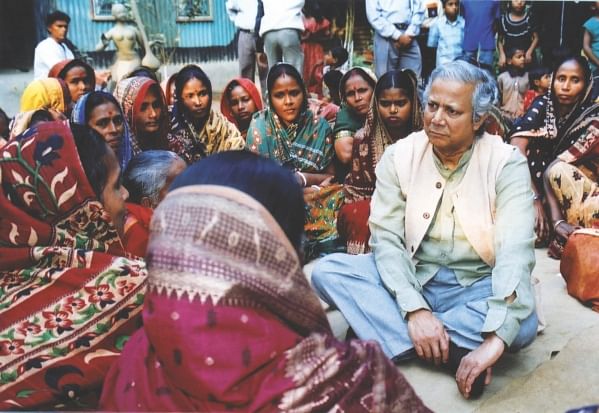| Home - Back Issues - The Team - Contact Us |
 |
| Volume 11 |Issue 37| September 21, 2012 | |
|
|
Special Feature
Grameen Bank at the Bureaucratic Altar Akram Hosen If one has to pick a recurring phenomenon that has characterised the three years of Awami League-led ruling alliance's regime, it would be the government's failure or reluctance to bring to justice the masterminds behind multiple financial scams. On one hand, the government has ignored the probe committee's findings on the misappropriation of funds in the share market and not taken any proper action against the criminals behind the largest banking scam in the country; on the other hand, the prime minister's vicious comments and actions against Grameen Bank and Professor Muhammad Yunus have not only disrupted the activities of the Nobel Prize-winning institution but threatens to ruin one of the most successful banking institutions of the world. We can begin by taking a look at what's happening in one of our nationalised commercial banks. After the Tk. 4,000-crore loan scam was made public, Sonali bank authorities initially suspended only 17 of its midlevel officia ls. After a couple of days of moderate media outcry, the bank recommended the finance ministry to take action against two of the bank's Deputy Managing Directors (MDs). While the general public demands exemplary punishment of those who were involved in the swindle, serious concerns about the efficiency of the banking and auditing systems in the national banks have been expressed by many. Finance Minister AMA Muhith's remark on the issue has been particularly jarring: Tk 4,000 crore loan scam of Sonali Bank is not a big amount, he said. "People for nothing are raising hue and cry on the issue and tarnishing the image of the country." Later, under severe media pressure, he apologised for the crass remark. But when it came to Grameen Bank, a unique institution that won a Nobel Prize for peace, the incumbent government stepped over the line to demonstrate its commitment to 'stringent rules'. The proposed rationale behind the removal of Prof Yunus from the most successful micro-lender was that the institution was owned by the government and as its MD, Prof Yunus was a government employee. In that conjecture, it was pointed out that the government's rule for retirement age limit was 60 years. Hence it was illegal of Prof Yunus to occupy the position of MD when he reached the age of retirement twelve years ago. But facts remain facts. The Article about the appointment of MD in the 1990 amendment of the Grameen Bank Ordinance stated: There shall be a Managing Director of the Bank who shall be appointed by the board with the prior approval of the Bangladesh Bank. 14. (1) According to this provision, Grameen Bank sought Bangladesh Bank's approval to appoint Prof Yunus as the MD. In a letter of 25-08-1990, Bangladesh Bank approved the appointment of Prof Muhammad Yunus as the MD of Grameen Bank. But it did not mention any age limit of the MD. Accordingly, Prof Yunus was appointed as the MD without mentioning any age limit. Nine years later, in the 52nd meeting of Grameen Bank Board of Directors, it was decided that Yunus would continue as the MD, until the board decides otherwise. The directors decided that as the power of appointment was vested with the board, the 60-year age limit for retirement for general staff contained in the bank's service rules established in 1993 would not apply to Yunus. In 2002, Bangladesh Bank again reviewed and cleared Prof Yunus's appointment as the MD. He was 61 at that time. In the following 11 years, the central bank authorities never mentioned the issue. Not even the Awami League-led government when it was previously in power question about Yunus's age, although he was well over 60 at the time. As a result, the outcry over his age during the last one year makes one wonder if there are other motives behind the constant nitpicking about Grameen bank. Currently, the private shareholders own 97 percent of the institution. The rest of the three percent is owned by the government. “I ask how a three percent share holder can change the legal framework of an institution without the consent of the 97 percent owners,” says Barrister Manzoor Hasan, advisor of Institute of Governance Studies (IGS) of Brac University, when asked for his comments. He also thinks that the government has lent itself to legal challenge through this decision. “Minority cannot make decisions on behalf of the majority. It defies common sense. One does not have to be a law expert to see the inconsistencies,” says Barrister Hasan. Since the legal basis for recent changes is "very weak", he thinks that the changes will not sustain. Unlike any of our nationalised banks, Grameen Bank was an ideal in the banking sector and was never accused of any corruption. Dr Kamal Hossain sees the government intervention as a form of expropriation on the institution owned by poor woman. “According to the constitution, the government can nationalise and denationalise properties and institutions,” says Dr Hossain. He adds that our constitution allows nationalisation of institutions in certain circumstances but they were not followed in this case. “Besides, this is not the era of nationalisation. Rather, steps are being taken everywhere to privatise and denationalise institutions,” he points out. When the government takes over any private property or institution, two things are always considered: the legal justification and payment of compensation to the concerned parties, informs Barrister Manzoor Hasan. “Private properties can't be taken at whim in any civilised country. If they do that, it has to follow the law of the land. It's also against our constitution which emphasises the importance of paying proper compensation,” he says. However, the Grameen Bank Amendment Act 2012 dictates that the chairman of Grameen Bank in consultation with the board of directors will form a selection committee to prepare a three-member panel for appointing a MD of the bank. Then the board, with an approval from the Bangladesh Bank, will appoint the MD from the panel.
Asked for his take on the issue, Barrister Hasan says, “The chairman–and, for that matter, any person–should not enjoy the kind of power that the recent amendment has endowed him with.” He adds that the board of directors of such a large institution needs to be independent when it comes to making key decisions. “I wonder if too much executive power has been given to one person. It's a step which will inevitably affect the independence of the board,” he says. Last year, when a series of stock market crashes rendered hundreds of thousands of small time investors penniless, a four-member probe committee headed by Khondkar Ibrahim Khaled, former deputy governor of Bangladesh Bank, submitted its 320-page report to Finance Minister AMA Muhith. Experts said that no point was too small or too big for the immaculately prepared report. It identified around 100 persons, many of them 'powerful' people, who seemed to have been involved in the stock market manipulation that included embezzlement of Tk. 20,000 crore from the stock market. The Finance Minister immediately pledged that all those responsible for the debacle would be brought to justice. However, he was quick to clarify that the names of those mentioned in the report would be deleted before the report was to be published. The committee also recommended a major overhaul of the Securities and Exchange Commission (SEC). But as time went by, the people of this country witnessed with amazement that no significant action was taken against the individuals and institutions responsible for the stock market debacle. People fear that the criminals behind the recent loan scam would also go scot-free. Suspension from their position in the bank cannot be regarded as a suitable punishment of their crimes. Coming back to Prof Yunus's bank, Bangladesh Bank has routinely audited Grameen Bank every year. “On the one hand, they are not taking any effective steps to solve what's going on in the nationalised banks that are constantly breaching Bangladesh Bank's directives,” says Dr Kamal Hossain, “On the other, they are after an institution that was never accused of any irregularities in the last 30 years, especially when none of the owners have ever complained against the bank.” Referring to the high interest rates charged by the Grameen Bank, the prime minister called Yunus a "bloodsucker of the poor". But her silence about the other micro-loan organisations reveals that her distaste for Prof Yunus is not based on their ideological differences. Bangladesh Microcredit Regulatory Authority (MRA) has set the highest interest rate for any microcredit institutions at 27 percent. We know that the highest rate of interest in Grameen Bank is 20 percent. There are 8.4 million members of Grameen Bank. Nearly 5.5 million of them have bought shares in the bank. Collectively, they are the ones who own 97 percent of the bank. They are the ones who are the real stakeholders in issues concerning the bank. The price of each share of Grameen Bank is Tk. 100. When a member owns a share of Tk 100, he/she also gets entitled to vote in the elections for membership of the board of directors. Over the decades, it used to be the board of directors who elected their MD. It is beyond doubt that the recent amendment, when put to action, will introduce bureaucratic tangles to the institution and partly disempower all the female members of Grameen Bank, thus contradicting the basic philosophy behind micro-credit: to empower women who have no assets. “This law will not serve any public purpose. Rather, it will harm public rights,” concludes Dr Hossain. The bank may have been functioning well without Prof Yunus, but in the long run, there is concern that his permanent absence from the institution may prove to be damaging, if not disastrous.
Copyright
(R) thedailystar.net 2012 |

